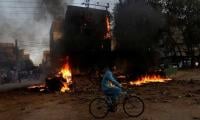The recent order of Karachi Police Chief Amir Shaikh, asking cops not to harass couples is worth appreciating. Moral policing has already done much damage to society since the time of dictator Gen Zia despotic rule that not only encouraged religious bigots but also tore the social fabric of Pakistani society through its retrogressive and obscurantist way of dealing with social issues.
The police would unnecessarily disturb couples at different picnic and recreational points in Karachi, asking for their marriage contracts. Such attitude discouraged many people from frequenting recreational points. This attitude of law-enforcement officials is only tolerated in theocratic states but should have no space in a democratic country like Pakistan – and that too in the province of Z A Bhutto and Benazir Bhutto who claimed to work for individual freedoms and democratic norms.
We have already had enough moral policing in the last few decades. Now we need to put an end to this. It may also be mentioned that such moral policing is carried out in Punjab and Karachi universities and many other educational institutions of the country by a religious student organisation. Naturally, the Sindh government cannot do anything to stop such practices in Punjab and other federating units but it must make sincere efforts to end moral policing in Karachi University, NED University and other educational institutions of Sindh. The government cannot offer any excuse because after the 18th Amendment educational institutions fall under the jurisdictions of the provincial governments.
Moral brigades have turned the lives of many people into hell. A few weeks ago some security guards in an Islamabad park caught a couple alone in the park. They coerced the man into fleeing and later gang raped the hapless woman. The incident led to outrage, forcing the local administration to take prompt action. We must remember that most of the people who frequent public recreational places are from either the bottom layer of social stratification or from the lower middle class. The order of the Karachi police chief will encourage such people to visit these places without any fear of being harassed.
While this action is worth praising, more steps are needed to improve the performance of the police and other departments in Sindh government. In Karachi ,street crimes are still rampant. The government needs to ensure that the much-vaunted camera system that was put in place years ago works properly. On their part, the police need to quickly arrest those who are caught on camera committing robbery or snatching mobiles. It is a common complaint that the police do not move against criminals even if their faces are very clear and recognisable. A number of cops can be seen harassing ordinary motorcyclists for petty bribes. Most of these motorcyclists are from the marginalised sections of society. The government needs to make the process of making licences for motorcyclists easy so they can be saved from this harassment.
The police should also be bound to work within their legal domain only. They should not be allowed to harass those who are involved in building their houses or carrying out extension works. It has been observed that if citizens build their houses, police mobiles appear within no time, harassing labourers or in some cases arresting them and taking them to police stations. This alacrity really surprises citizens who wait for hours to get a simple FIR registered. The Sindh Building Control Authority and other departments are already there to look after these issues and there is no need for the police to deal with these issues.
There is also a perception among some that the police collude with land grabbers and other criminals. The Sindh government needs to dispel this impression and break such nexus – if it exists – between the police and land grabbers. A number of allottees, who invested their lifelong savings into plots in various housing schemes, complain that their plots have been encroached upon by land grabbers. The Sindh government and the Karachi police need to quickly move against such elements. There should be a special desk created to address this issue because a number of allottees are overseas Pakistanis who toiled day and night to make money to buy such plots for future construction.
In every civilised country, the police are not only openly criticised but the problems of cops are also taken into consideration and efforts are made to address them. It is observed that police personnel work tirelessly for several hours, sometimes even 12 and 14 hours. They are not provided enough expenses. This presumably forces them to use illegal means to meet these expenses. So, it is important that police duty timings are fixed and they are even allowed to find part-time jobs so that they have alternate ways of earning. This might go some way in curbing rampant corrupt practices. In addition to that, the salaries of police personnel should be increased in accordance with the rising inflation.
In health, it is heartening to learn that the Sindh government has made around 1400 basic health units functional, launched mobile service for heart patients, equipped the National Institute of Cardiovascular Diseases and improved Taluka hospitals. But, at the same time, the government needs to take a torrent of criticism into account that claims that the Sindh government did not do enough for preventive care. For instance, Hepatitis cases are on the rise in Sindh and one of the reasons for that is the lack of potable water.
The government needs to make efforts to ensure the provision of clean drinking water. It is estimated that 80 percent diseases are water borne. If the government addresses this issue, it will not have to pump billions of rupees into buying extremely expensive machines. Many health experts believe that the government needs to make more basic health units functional instead of spending huge amounts of money on ultra-modern machines. It is also a common complain that several Sindh government hospitals are equipped with ultra sound and other modern machines but doctors send poor patients to private laboratories for tests, claiming that the machines at government hospitals are not working well or that their results are not reliable.
In the education department, it is good to hear that Sindh Education Minister Sardar Shah has admitted his daughter into a government school. But it may also be mentioned that an MPA of the PML-N in Punjab did the same thing a few years ago. Despite all that, the highest number of out-of-school children is from the most populous province.
Maybe all ministers, provincial law makers and government servants should be asked to send their children to government schools. Such an action could dramatically contribute to improving Sindh’s education system. So, in a nutshell: while some actions of the Sindh government are worth praising, much still needs to be done to improve governance in the province.
The writer is a freelance journalist.
Email: egalitarianism444@ gmail.com
Most recently US presidential elections demonstrated how AI has amplified partisan split through turbocharged...
Few years ago, Pakistan ranked as fourth-largest freelancer market globally, with potential to become number one
Arts Council Karachi celebrated its 70th birth anniversary at inaugural session with big cake
There are over 11 million Pakistanis settled abroad, out of which around six million work in Gulf and Middle East
This year alone, US Treasury would have to roll-over $10 to $14 trillion in maturing short-term debt
Tear gas no longer marks just protest sites; it paints entire cities as battlegrounds but then again, PTI did it first







